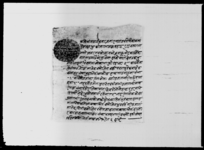A letter from Jagata Jaṅga Bahādura Rāṇā to officials in Kutāṅbhoṭ regarding Dasaĩ practices (VS 1934)
ID: E_3446_0011
Edited and
translated by Astrid Zotter
Created: 2018-06-21;
Last modified: 2020-08-05
For the metadata of the document, click here
The accompanying edition, translation/synopsis and/or commentary are available under the terms of the Creative Commons Attribution-ShareAlike 4.0 International License
Abstract
This letter from the eastern commanding general, Jagata Jaṅga Rāṇā, issued to officials in Kutāṅbhoṭ in the Aṭhāra Saya Kholā region, exempts villages from any obligation to sacrifice buffaloes and goats on the occasion of the Dasaĩ festival in view of the fact that the jimmāvāla of the region had earlier been granted the authority to have this festival performed according to the usual practice in the region, where blood sacrifices were avoided.Diplomatic edition
[1r]
[seal of Jagata Jaṅga Bahādura Rāṇā]1स्वस्तिश्रीमद्राजकुमारकुमारात्मजपुर्वतर्फकाकम्या2डिङजनरल•श्रीजगतजङ्गवहादूरराणाकस्यपत्रम्
3आगेअठारसयखोलामध्येकुताङ्भोट्काजिंमा
4वालरगाउगाउकामुषियाहरूकेयथोचितउप्रान्त•
5हामीलाइ•गरीवक्स्याकालोकाभारकोपट्टामा १¯ ¯ ¯ कादसैमा
6मुलीषर्चजोछसाविकवमोजिम•कत⟪ट्ट्⟫ीनघटाइठेकवाहेक
7चलाउनुभंन्यामुद्रालेषीयाकोछ•हाम्रागाउगाउमाभंन्या
8¯ ¯१ ¯ कादसैपुजामा•राँगावोकावलीपुजागर्न्यारीतछैनघ्यां
9ङ्मा¯१¯ ¯ लाइदसैपुजामाधुपदिपवत्तीवालीपुजागर्न्यामात्र
10रीतछभंन्यावेहोराजिम्मवालछिमदोर्ज्येलेहाम्राहजुरमावि
11न्तिपार्दा•जाहेरभयोतसर्थ•दसैमार¯१¯ ¯ लाइराँगावोकाकोवली
12पुजागर्न्या•रीतनचल्याकोसाचोहोभन्यातिमीहरूकागाउगाउ
13मासाविकचलिआयाकाथितीवमोजिमधुपवत्तीगरीपुजागर्नु
14साविक्•थितीवमोजिमदसैपुजाचलायाकामातिमीहरूला
15इषतवातलागन्याछैनभंन्यादस्षतगरीवक्स्यौइतीसम्वत्
16१९३४सालमितीमाघवदी१०रोज२शुभ्ं
Translation
[1r]
[seal of Jagata Jaṅga Bahādura Rāṇā]
Hail! A letter of the venerable prince, son of a prince, the eastern commanding general, ŚrīJagata Jāṅga Bahādura Rāṇā
Āge: To the chief contractor (jimmāvāla) and the village headmen (mukhiyā) of Kutāṅbhoṭ in Aṭhāra Saya Kholā
Yathocitauprānta: [The following] details came to our notice when Jimmāvāla Chima Dorje made a petition to us, stating: "In the lokābhāra lease contract (paṭṭā) issued to us a sealed authorization (mudrā) is written, stating: 'Besides [the commitments under] the contract (ṭheka), arrange for what are the ordinary expenses during the Dasaĩ [worship] of -1-1 without any reduction in the previous outlay.' As to [what is done] in our villages during the Dasaĩ worship for [*deities], there is no custom of performing worship with the sacrifice of buffaloes and goats. There is only the custom of performing worship at the ghyāṅ by lighting incense and lamps during the Dasaĩ worship of [*deities]." Therefore, if it is true that there is no custom of performing worship with the sacrifice of buffaloes and goats during the Dasaĩ period and to [*deities], then perform worship in your villages by employing incense and lamps according to the practice (thiti) that is usually performed. We [hereunto] set our hand (daskhatagaribaksyaũ), [pledging] that no charges will be pressed against you for continuing the Dasaĩ worship according to the customary practice.
Monday, the 10th of the dark fortnight of Māgha of the [Vikrama] era year 1934 (28 January 1878 CE).
Commentary
This document exempts the villages of Kutāṅbhoṭ from any obligation to sacrifice animals on the occasion of Dasaĩ. Issued by the eastern commanding general, it refers to a previous petition (probably a formal bintīpatra) submitted by the holder of the tax contract, the local jimmāvāla Chima Dorje. The petition is cited verbatim, including a quoted section of the tax contract that served as the official written appointment of Chima Dorje to his post. Though this earlier contract does not appear to be extant—at least it is not part of what was microfilmed in the same set of documents as the present one (i.e. reels NGMPP 3446 and 3447, microfilmed at Prok, Nubri, collection of Tsering Wangdu)—there is a lokābhāra contract concerning Sāmāgāu, issued by Candra Śamśera to Jimmāvāla Dorjye Ḍhaṃdul in Phālguna VS 1957 (1901 CE), which has a similar passage reading: -3-kā jātrā dasaipujā māmulī ṣarca kehi garnu parne bhayā sāvīk bamojīm kati naghaṭāī ṭekbahek calāunu, "Besides [the commitments under] the contract (ṭheka), arrange for whatever is to be done and what are the usual expenses for the processions (jātrā) and the Dasaĩ worship for -3- (the upper part of this document, like that of the present one, is broken off) without any reduction in the previous outlay." (E_3446_0022, ll. 30–31).2 Referring to such a passage, Chima Dorje claims the right to follow the customary practice of not performing blood sacrifice and is granted it.
People in the Aṭhāra Saya Kholā region seem to have generally adopted a critical stance towards killing animals. In Tsum, a declaration was released in 1921 (and reformulated several times on subsequent occasions) which commits people to refrain from violence against animals (see Plachta forthcoming).
An exemption being made to the villages of Kutāṅbhoṭ together with a guarantee that no charges will be pressed against villagers who do not sacrifice presupposes an actual obligation imposed by the state to perform blood sacrifices on the occasion of the Dasaĩ festival; on administrative measures having to do with buffalo sacrifices, see Zotter forthcoming.

